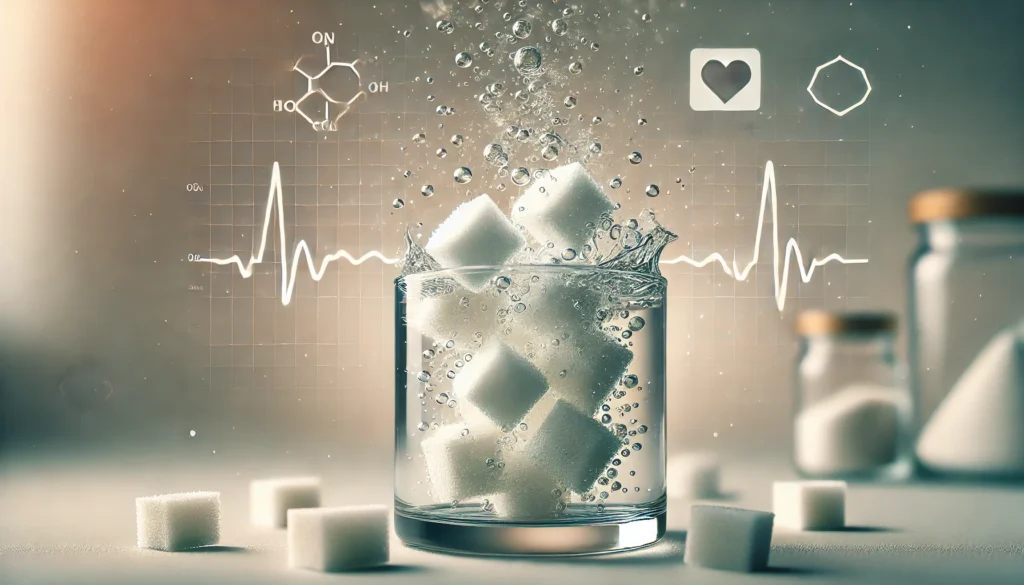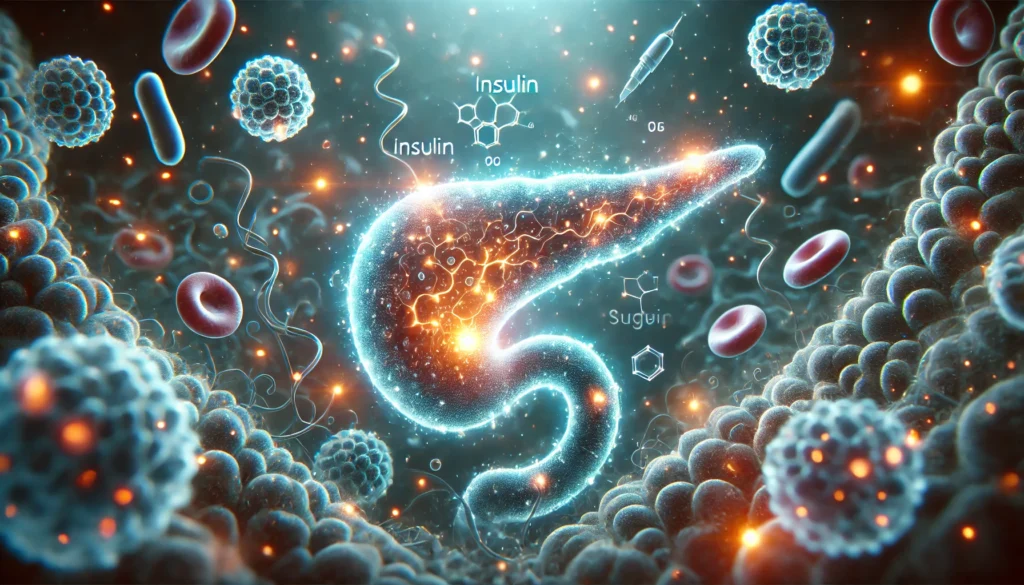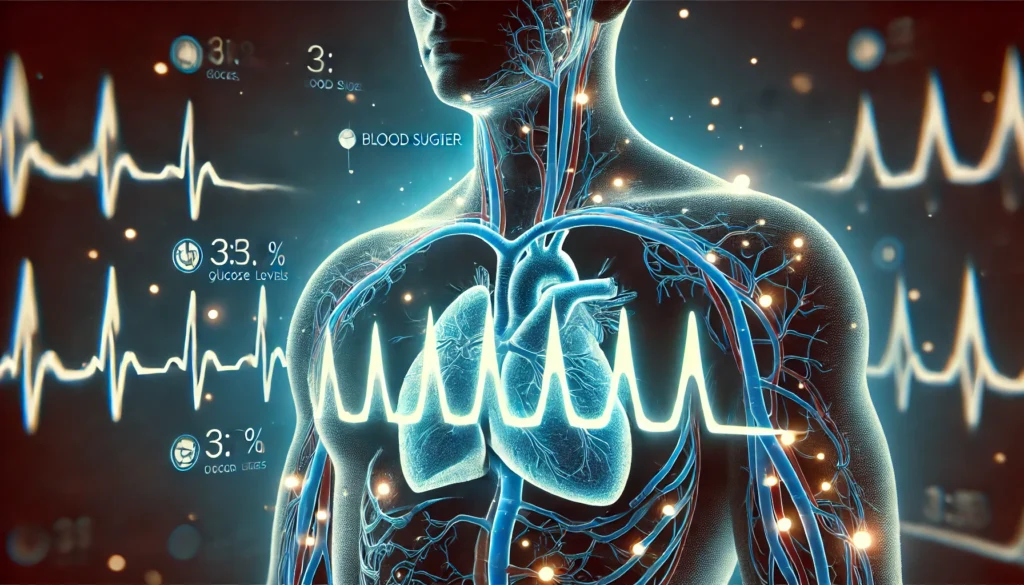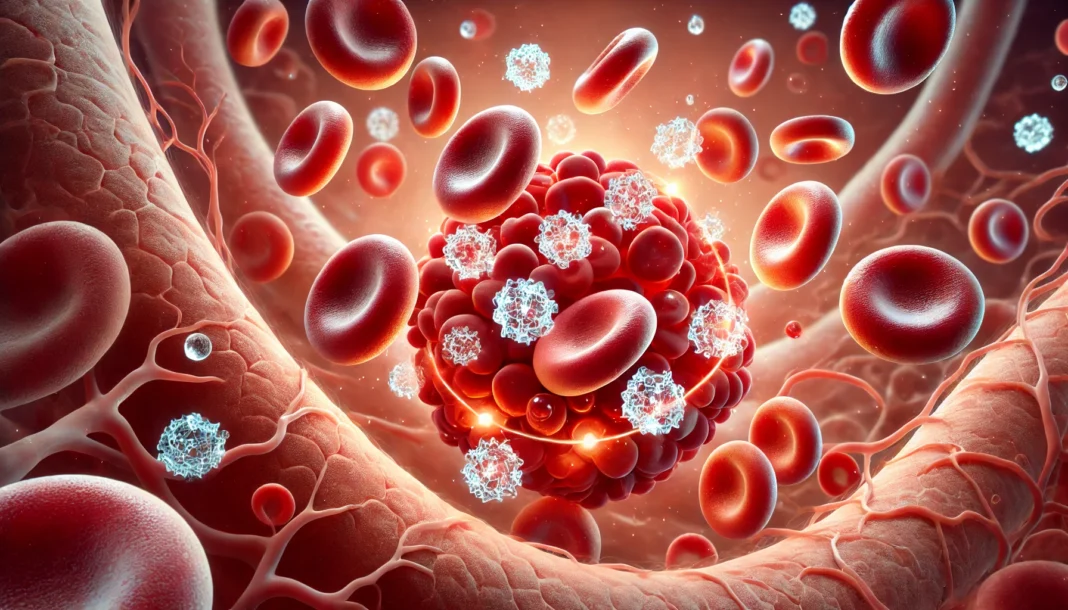Understanding what happens when a diabetic eats sugar is essential for managing blood glucose levels and preventing complications. Diabetes, a chronic condition that affects the body’s ability to regulate blood sugar, presents unique challenges when it comes to sugar consumption. Whether a person has Type 1 or Type 2 diabetes, the body responds to sugar differently compared to individuals without the condition. This article explores the physiological processes that occur when a diabetic consumes sugar, including glucose spikes, insulin response, and long-term health implications. Additionally, we will examine how dietary choices, lifestyle modifications, and medical interventions can help mitigate the risks associated with sugar intake.
You may also like: How Diabetes Affects the Brain: Understanding Brain Fog, Memory Loss, and Mental Confusion from High Blood Sugar
The Role of Glucose in the Body
Glucose is a fundamental energy source for the body. It is derived from carbohydrates and serves as fuel for cells, tissues, and organs. When consumed, carbohydrates are broken down into glucose, which enters the bloodstream. In individuals without diabetes, the pancreas releases insulin to facilitate glucose uptake by cells, thereby maintaining stable blood sugar levels. However, for people with diabetes, this regulatory mechanism is impaired. Either the pancreas does not produce sufficient insulin (as in Type 1 diabetes), or the body’s cells do not respond properly to insulin (as in Type 2 diabetes). As a result, glucose remains in the bloodstream for longer periods, leading to hyperglycemia, or high blood sugar.

What Happens When a Diabetic Eats Sugar?
When a diabetic consumes sugar, the body struggles to regulate glucose effectively. The extent of this difficulty depends on the type and severity of diabetes, as well as individual factors such as insulin sensitivity, medication, and overall diet. Upon ingesting sugar, the digestive system breaks it down into glucose, which is then absorbed into the bloodstream. Without sufficient insulin action, glucose accumulates, causing a spike in blood sugar levels. The severity of this spike can vary based on factors such as the glycemic index of the food, portion size, and the presence of fiber, protein, and fat in the meal.
The Immediate Impact of Sugar on Blood Glucose Levels
A rapid rise in blood sugar levels can lead to acute symptoms such as excessive thirst, frequent urination, fatigue, and difficulty concentrating. For individuals with Type 1 diabetes who rely on exogenous insulin, eating sugar without appropriate insulin administration can result in dangerously high blood sugar levels. In Type 2 diabetes, where insulin resistance is a primary concern, sugar consumption can exacerbate insulin dysfunction and make it harder to maintain glucose control. The body may respond by increasing insulin production, but if insulin resistance is significant, this compensatory mechanism may not be sufficient to bring blood sugar levels down effectively.
The Insulin Response and Its Limitations
Insulin is essential for glucose regulation, but its effectiveness varies among diabetics. In Type 1 diabetes, the immune system attacks insulin-producing beta cells in the pancreas, leading to little or no insulin production. As a result, people with Type 1 diabetes must administer insulin externally to manage blood sugar levels. In Type 2 diabetes, insulin resistance prevents cells from efficiently using insulin. The pancreas may initially compensate by producing more insulin, but over time, this can lead to beta-cell exhaustion and decreased insulin production. In both cases, consuming sugar without proper management can result in prolonged hyperglycemia, increasing the risk of complications.
Glycemic Index and Sugar Absorption
The glycemic index (GI) is a useful tool for understanding how different foods affect blood sugar levels. High-GI foods, such as white bread, candy, and sugary beverages, cause rapid spikes in blood sugar. In contrast, low-GI foods, such as whole grains, legumes, and non-starchy vegetables, lead to a slower, more gradual increase in blood glucose. Diabetics benefit from prioritizing low-GI foods to minimize blood sugar fluctuations. Combining carbohydrates with fiber, protein, and healthy fats can further moderate glucose absorption, preventing sharp spikes and crashes.
Short-Term and Long-Term Consequences of High Blood Sugar
Frequent blood sugar spikes can have both short-term and long-term effects on health. In the short term, high blood sugar levels can cause dehydration, headaches, blurred vision, and cognitive impairment. If left uncontrolled, hyperglycemia can progress to diabetic ketoacidosis (DKA) in Type 1 diabetes or hyperosmolar hyperglycemic state (HHS) in Type 2 diabetes—both of which are life-threatening conditions requiring immediate medical intervention. Over time, persistent hyperglycemia contributes to complications such as neuropathy, retinopathy, kidney disease, cardiovascular disease, and an increased risk of infections.
Dietary Strategies for Managing Sugar Intake
Managing sugar consumption is a crucial aspect of diabetes care. Diabetics do not necessarily need to eliminate sugar entirely but should be mindful of its sources and quantity. Choosing natural sugars from fruits, pairing carbohydrates with protein and fiber, and opting for whole foods over processed products can help regulate blood sugar levels. Monitoring carbohydrate intake through counting methods or the plate method can provide further guidance. Additionally, staying hydrated, engaging in regular physical activity, and taking prescribed medications as directed play essential roles in blood sugar management.
The Role of Medication and Insulin Therapy
For many diabetics, medication and insulin therapy are necessary to maintain blood sugar control. Insulin injections, insulin pumps, and continuous glucose monitors (CGMs) are commonly used to manage Type 1 diabetes. In Type 2 diabetes, medications such as metformin, sulfonylureas, GLP-1 receptor agonists, and SGLT2 inhibitors help improve insulin sensitivity and glucose regulation. Regular monitoring of blood glucose levels allows diabetics to make informed decisions about medication adjustments and dietary choices.
How Lifestyle Modifications Can Improve Blood Sugar Control
Lifestyle changes play a significant role in diabetes management. Regular exercise helps improve insulin sensitivity and facilitates glucose uptake by muscles. Strength training and cardiovascular activities both contribute to better blood sugar control. Additionally, stress management techniques such as mindfulness, meditation, and adequate sleep can positively impact insulin function. Establishing a consistent routine for meals, exercise, and medication adherence supports overall glucose stability.

Frequently Asked Questions (FAQ) – Advanced Insights into Sugar Intake and Diabetes
1. How does the timing of sugar intake affect diabetic blood sugar control?
The timing of sugar intake can significantly influence glycemic stability. For instance, what happens when a diabetic eats sugar immediately after exercise differs greatly from sugar intake during periods of inactivity. Post-workout, muscles are more insulin-sensitive, meaning sugar may be absorbed more efficiently, leading to less dramatic blood glucose spikes. Conversely, consuming sugar late at night may result in elevated morning blood sugar levels due to the dawn phenomenon. Understanding this nuance helps answer not only what happens when a diabetic eats sugar but also why timing plays a pivotal role in effective diabetes management.
2. Can emotional stress change the way sugar affects diabetics?
Absolutely. Psychological stress alters hormonal responses, particularly increasing cortisol levels, which in turn affect how the body processes sugar. What happens when a diabetic eats sugar under stress is often a more exaggerated glucose spike due to insulin resistance triggered by stress hormones. This means the same sugary snack may cause a higher post-meal glucose reading during stress than during calm periods. Understanding this connection is essential for individuals trying to manage unpredictable blood sugar swings. It’s also a key reason why emotional regulation is as important as dietary choices.
3. Do diabetics need sugar for brain function like non-diabetics do?
Yes, but the source and regulation of that sugar intake must be more controlled. The brain relies on glucose to function, so the question “do diabetics need sugar” has a nuanced answer. While their brains require glucose just like anyone else’s, it doesn’t mean they should consume refined sugars or high-glycemic foods to meet that need. Instead, complex carbohydrates and balanced meals provide sustained glucose without spikes. This regulated approach supports cognition while minimizing the risks associated with abrupt glucose elevation.
4. Is it ever safe for a diabetic to consume sugary treats?
Surprisingly, yes—under the right conditions. What happens when a diabetic eats sugar in a planned and informed way is very different from spontaneous indulgence. If the sugar is consumed alongside protein or fiber, or as part of a balanced meal, the blood glucose response can be moderated. Many certified diabetes educators advise occasional treats, especially during celebrations, as long as insulin or medication dosage is properly adjusted. This supports emotional well-being and dietary flexibility, helping diabetics avoid feeling overly restricted.
5. How does sugar affect diabetics differently depending on the type of diabetes?
Understanding the difference between type 1 and type 2 is crucial. In type 1 diabetes, what happens when a diabetic eats sugar largely depends on insulin timing and dosage. In type 2, it’s more about insulin sensitivity and resistance. So while both groups must monitor sugar intake, their approaches differ. For type 1, miscalculating insulin can result in immediate hyperglycemia or hypoglycemia. For type 2, excessive sugar over time worsens insulin resistance. This distinction is essential in tailoring sugar management strategies for individual needs.
6. Are there situations where diabetics are advised to consume sugar?
Yes—during hypoglycemia, consuming sugar becomes essential. This directly addresses the question “do diabetics need sugar” in urgent situations. A fast-acting source like glucose tablets or fruit juice is critical when blood sugar drops below safe levels. Without immediate intake, hypoglycemia can lead to confusion, loss of consciousness, or seizures. This scenario demonstrates that sugar, while often restricted, can act as a life-saving tool when used correctly and at the right time. Diabetics should always carry an emergency sugar source with them.
7. How do artificial sweeteners influence blood sugar differently than natural sugar?
Artificial sweeteners typically don’t cause the same glucose spike, but they still impact the body in complex ways. While they seem like a safe alternative, some studies suggest they may alter gut microbiota or increase cravings for sweet foods. So, what happens when a diabetic eats sugar substitutes repeatedly is not always benign—especially if it leads to overconsumption of other carbs. While artificial sweeteners can help reduce sugar intake, they should be used mindfully, not as a license to indulge in high-carb meals.
8. Do diabetics need sugar differently based on activity levels?
Definitely. Physically active diabetics may have more flexibility in their carbohydrate intake. Do diabetics need sugar before or after workouts? In many cases, yes—especially if their activity increases the risk of hypoglycemia. For instance, a long-distance runner with type 1 diabetes may need to consume quick carbs mid-race to maintain stable blood sugar. Conversely, sedentary individuals should avoid unplanned sugar to prevent hyperglycemia. This shows how lifestyle and activity level personalize the answer to this question.
9. What are the long-term consequences of poorly managed sugar intake in diabetics?
Consistently unregulated sugar intake can accelerate the onset of complications. When we ask what happens when a diabetic eats sugar excessively over time, the answer includes elevated risks for neuropathy, retinopathy, kidney disease, and cardiovascular conditions. Long-term exposure to high glucose damages blood vessels and nerves. However, occasional, mindful sugar consumption within a structured plan typically doesn’t lead to such outcomes. It’s the chronic overuse or under-management that leads to irreversible harm.
10. How does cultural perception affect diabetic sugar consumption?
Cultural norms heavily influence dietary habits, sometimes to the detriment of diabetic health. In many cultures, sweets are central to hospitality or religious rituals. This makes managing sugar intake socially challenging. What happens when a diabetic eats sugar in such cultural settings often involves peer pressure or guilt, especially if refusing is seen as impolite. Public health education must account for these dynamics by promoting diabetic-safe alternatives within traditional customs. Socially aware strategies can help diabetics navigate these complex situations without sacrificing their health.

Conclusion: Managing Sugar Intake for Optimal Diabetes Control
Understanding what happens when a diabetic eats sugar is key to making informed dietary and lifestyle choices. Blood sugar spikes, insulin response, and long-term health implications underscore the importance of mindful eating and proper diabetes management. By prioritizing low-GI foods, monitoring blood sugar levels, and incorporating lifestyle modifications, diabetics can navigate sugar consumption more effectively. With a combination of medical guidance, healthy habits, and individualized care, individuals with diabetes can maintain stable glucose levels and reduce the risk of complications.
diabetes and blood sugar levels, glucose spikes in diabetes, managing diabetes with diet, insulin response to sugar, diabetes-friendly meal planning, how sugar affects diabetics, glycemic index and diabetes, controlling blood sugar naturally, insulin resistance and sugar, type 1 diabetes and sugar intake, type 2 diabetes diet strategies, effects of sugar on diabetic health, low-GI foods for diabetes, diabetes medication and glucose control, preventing diabetes complications, sugar metabolism in diabetics, healthy eating with diabetes, exercise and blood sugar regulation, diabetes nutrition science, long-term effects of high blood sugar
Further Reading:
What to Do If You Eat Too Much Sugar When You Have Diabetes
Can you get diabetes from eating too much sugar?
Disclaimer: The content published on Better Nutrition News (https://betternutritionnews.com) is for informational and educational purposes only. It is not intended as a substitute for professional medical advice, diagnosis, or treatment. Always seek the guidance of a qualified healthcare professional before making any changes to your diet, nutrition, or wellness practices. The opinions expressed by authors and contributors are their own and do not necessarily reflect those of Better Nutrition News.
Better Nutrition News and its affiliates make no representations or warranties regarding the accuracy, completeness, or reliability of the information provided. We disclaim all liability for any loss, injury, or damage resulting from the use or reliance on the content published on this site. External links are provided for reference purposes only and do not imply endorsement.



